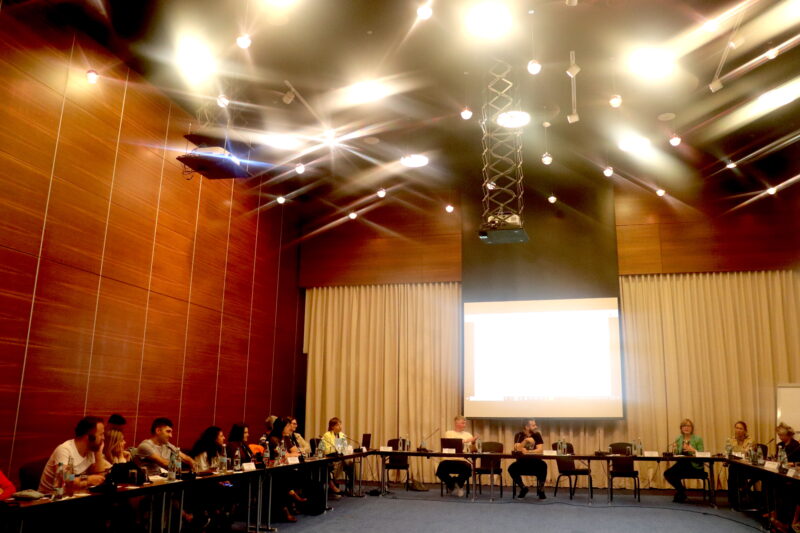From Sept 22-25, Internews held an international media conference, Information Saves Lives: Media at the Forefront of Events, in Tbilisi, Georgia, with participation from journalists and editors from Georgia, Ukraine, Moldova, and Armenia. The conference provided a forum to explore challenges and experiences with media work during wars and crises.
The program of the conference featured keynote presentations, panel discussions, trainings, and consulting. The participants focused on journalism’s storytelling, impact, and sustainability in Eastern Europe and the Caucasus.
“The theme of our conference is best reflected in Internews’s motto: Journalism Saves Lives, which we adopted as the title of the conference…. At no time are these words more meaningful than during wars and other crises….we hear stories about journalists providing lifesaving information about evacuation routes and bomb shelters, health risks and vaccination options, and other survival tips for coping with rapidly-changing developments in public life.”
Maia Mikashavidze, Internews Director in Georgia
Jason Lambert (Senior Director of Media Business, Internews) and Michelle Foster (Executive Director, News Consulting Group) led rapid-fire consulting sessions on audience engagement and digital business solutions.
Gillian McCormack (Chief of Party for Ukraine, Internews) shared innovative business development approaches donors have supported in Ukraine.
Zakhar Protsiuk (CEO, the Kyiv Independent) spoke about reader- and community-supported business models, while their Georgian counterparts, Ani Sirbiladze (Founder, DigitalNews.ge) and Nino Turashvili (Deputy Newsroom Director, Palitra Media), and George Gogua (Founder and Chief Editor, Project 64) focused on business solutions and audience engagement for small, local outlets.
Nino Japiashvili (Chief Editor, Radio Free Europe/Radio Liberty), filmmaker Nino Orjonikidze (Founder, Artefact Production), and renowned street artist Gagosha offered a practical learning session on storytelling.
“We are living in a time of crisis after crisis, disinformation, and propaganda. In these difficult times, journalists continue to stay at the forefront of events, often at great risk for their own safety, and can save lives with trustworthy information.“
Ulrik Tideström, Ambassador of Sweden to Georgia
Throughout the event, the Russian invasion of Ukraine was front of mind. As the keynote speaker Sevgil Musaeva, Editor-in-chief of Ukrainska Pravda in Ukraine said, “Information does save lives. The decision of Ukrainska Pravda to enable a security protocol ahead of the Russian invasion literally helped some journalists survive. Three people [in the newsroom] lost their family members, two joined the army, three joined territorial defense units, one spent time in occupied territory without food or electricity, relatives of six live under occupation, and one left the country to save their children.”
“I think that the main core of this war, the main element… is not the right of our country to exist, it’s not only the war between the future and the past, it’s not only the war for the future of democracy, but it’s also the war between the truth and the lies.”
Sevgil Musaeva, Editor-in-chief of Ukrainska Pravda in Ukraine, in an interview granted to Mediachecker at the Tbilisi International Media Conference
Panel discussions featured prominent Georgian, Armenian, Ukrainian, and Moldovan journalists highlighting impactful storytelling, audience reach, business solutions, and common challenges.
On the last day of the conference, the participants took part in a study visit to Mtisambebi, a local Georgian media outlet in the Kakheti region of Georgia. Mtisambebi brings news and investigates wrongdoings in the mountainous regions of Georgia. As a cultural detour, the participants visited the Alaverdi Monastery and the house museum of Alexander Chavchavadze, a 19th-century writer and a nobleman, in Tsinandali.
The conference was supported by Sweden through the “Audience understanding and digital support” AUDS project.
